Global South
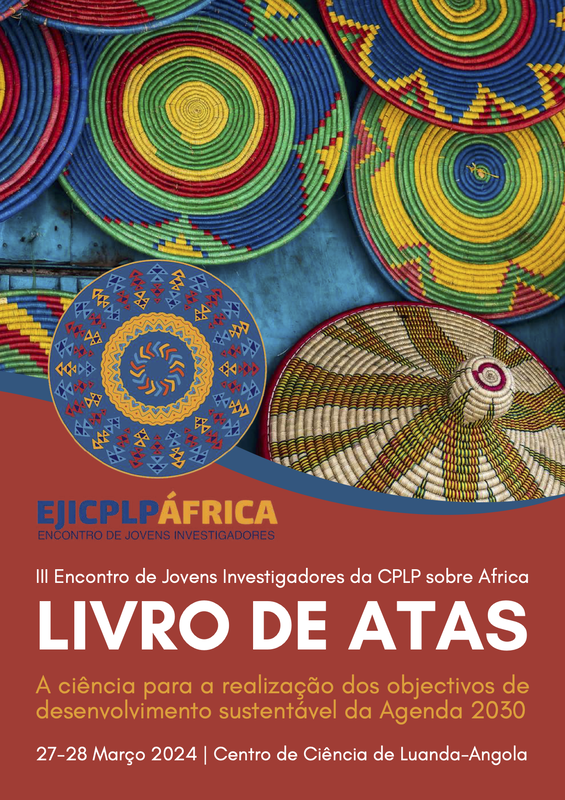
Ebook – 3rd EJICPLP Africa: A ciência para a realização dos Objectivos de Desenvolvimento Sustentável da Agenda 2030
Abstract:
It is with great pleasure that we present the outcomes of the 3rd Meeting of Young Researchers from the CPLP on Africa, held in Luanda on 27 and 28 March 2024. This event, which has already established itself as a key platform for science and development within the Community of Portuguese Language Countries (CPLP), brought together more than 700 participants around the theme “Science for the Achievement of the Sustainable Development Goals of the 2030 Agenda,” fostering a fertile environment for the exchange of ideas, reflections, and collaborations.
With around 30 speakers, including senior researchers, experts, and high-level national and international institutional representatives from various fields of study, eight thematic panels were discussed to deepen knowledge about Africa and its sustainable development, particularly in the areas of Tourism, Energy, Education, Economy, and African Women. The event addressed critical issues related to poverty eradication, environmental protection, and social prosperity. This edition highlighted the role of science in transforming African realities, reflecting on the implementation of the Sustainable Development Goals (SDGs) in the context of the Global South.
The importance of this Meeting goes beyond the impressive number of participants or the lively discussions that marked the two days of activities. The event is a unique scientific forum for young people across the CPLP and brings together a vibrant network of researchers in an itinerant and innovative format. It represents the collective effort of young researchers to give voice to issues that directly affect the development and future of their countries, reinforcing the scientific leadership of CPLP youth.
In this edition, 35 scientific papers by young researchers were presented, selected from among the 65 papers received through the Call for Papers, by a Scientific Committee composed of 30 professors from various universities in CPLP countries.
This book is more than a simple collection of articles; it represents the dedication of young researchers who strive to redefine the role of science in their societies. Through the discussions and analyses presented here, we hope not only to inspire new debates, but also to encourage concrete actions in support of inclusive and sustainable development in CPLP countries.
With the crucial support of the Centre for African and Development Studies (CEsA) and partner organisations such as Angola’s Ministry of Higher Education, Science, Technology and Innovation, and Felcos Umbria, this edition also demonstrates the value of collaboration and international partnerships essential to the success of this project.
We hope these pages offer an enriching perspective on the scientific contributions of Portuguese-speaking youth, as well as concrete actions towards inclusive and sustainable development, particularly in the PALOP countries.
We believe this book marks a milestone on the path towards a more open, collaborative, and transformative science.
Cite this e-book:
D’Abril, Cristina Molares e Jessica Falconi (2024). “III EJICPLP África: A ciência para a realização dos Objectivos de Desenvolvimento Sustentável da Agenda 2030”. ISBN: 978-989-54687-6-8

Working Paper 201/2025: A Glance at International Challenges of Refugee Crises in the New Millenium
Abstract:
This study investigates the intricate relationship between forced displacement and human development. By examining refugee outflows from key regions, this paper seeks to comprehend the factors driving these movements and their development implications. Employing a qualitative case study methodology, the research focuses on the five main refugee outflow countries in 2023. The paper finds that the most relevant factors that induce displacement are political violence, especially civil conflict, and climate change. Refugee emergencies have multiple aggravating elements, like economic crises, food insecurity, and infrastructure damage. Despite not identifying strong correlations between displacement and human development (measured through HDI), except for Syria, the study reveals that these emergencies are simultaneously humanitarian and developmental challenges. Repercussions are more prominent in the Global South since it is the origin and the destination of over 70% of displaced people. The findings reiterate the urgency for integrated policy responses that combine development and humanitarian efforts.
Cite this Working Paper:
Rocha, Marcela e Eduardo Moraes Sarmento (2025). “A glance at international challenges of refugee crises in the new millenium”. CEsA/CGS – Documentos de trabalho nº 201/2025

Entre eu e Deus by Yara Costa: An Unprecedented Representation of the Island of Mozambique
Abstract:
This article aims to dissect the documentary Entre eu e Deus with the primary objective of demonstrating that the director sets out to challenge images, representations and crystallized perceptions of the Island of Mozambique, Mozambican cultural identity and Islamic fundamentalism, and that she succeeds in doing so. The article consists of two main sections. The first provides a brief historical context of the Island of Mozambique and examines some visual representations that predate the documentary under analysis. Here, I pay particular attention to Licínio Azevedo’s documentary on the Island of Mozambique as a relevant antecedent of Yara Costa’s work. The second part provides a detailed analysis of Entre eu e Deus, demonstrating the director’s unprecedented representation of the Island of Mozambique.
Cite this Paper:
Falconi, J. (2024). Entre eu e Deus by Yara Costa: An Unprecedented Representation of the Island of Mozambique. Portuguese Studies 40(2), 175-188. https://dx.doi.org/10.1353/port.00014.
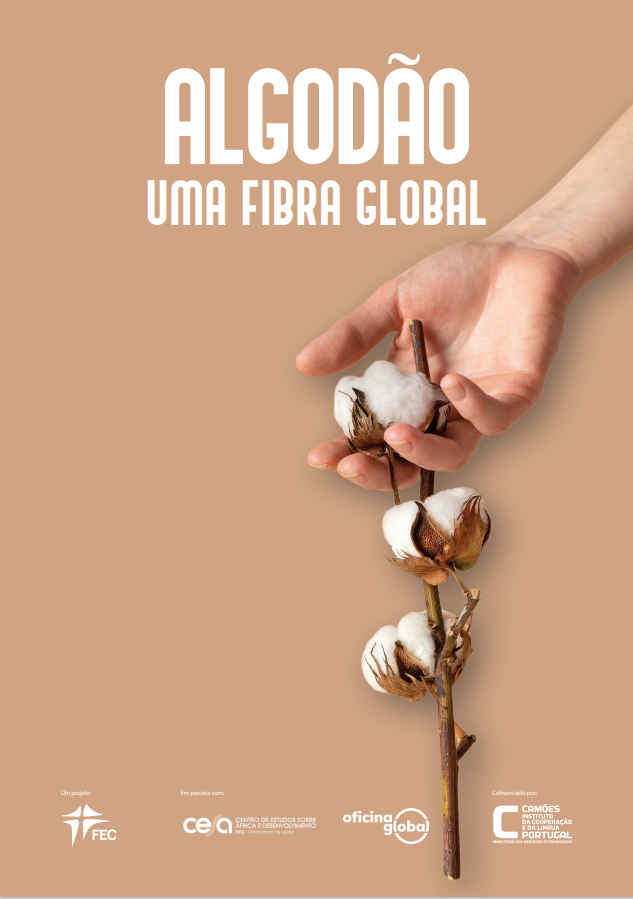
Algodão, uma fibra global
Abstract:
Cotton doesn’t lie. This well-known idiom in Portugal highlights how the most important natural fiber — both historically and commercially — has woven itself into our lives. Yet, while cotton doesn’t deceive, it does conceal. It’s more than just a fiber; it’s an entire global industry. It shapes production and consumption patterns, directly impacting the lives of millions worldwide. Cotton influences the fate of soils and water sources and significantly affects the environment. It encompasses agriculture, fashion, and high technology. Cotton has a complex and often troubling history: it can be sweet, but it’s also bitter. Its soft touch belies the complexity of its life cycle, which spans from cotton fields in Burkina Faso to garment factories in Bangladesh, fashion runways in Milan, and algorithms in New York. This distribution isn’t arbitrary: the value gap —evident in the income disparity between a field worker in Burkina Faso, a factory manager in Bangladesh, and a top designer in Milan — illustrates global inequalities. Cotton connects these diverse landscapes and activities. This briefing is for anyone who wants to understand the fashion they wear and the fibers they choose. It’s also for decision-makers regulating cotton production and consumption. Responsible consumption is a key step in altering economic structures, but it’s rarely enough on its own. Our aim is clear: meaningful action requires clarity, knowledge, and information.
Cite this ebook:
Bernardo, Luís Pais (2023). Algodão, uma fibra global. Lisboa: FEC | Fundação Fé e Cooperação.
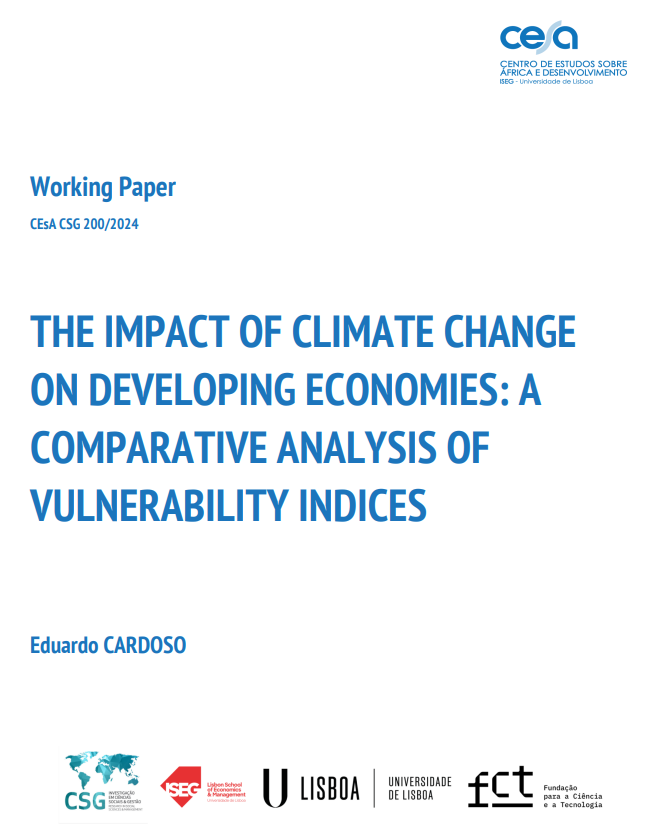
Working Paper 200/2024: The Impact of Climate Change on Developing Economies: A comparative analysis of vulnerability indices
Abstract:
In order to make informed decisions on climate finance and policies, there is an increasing need to develop an index to assess countries’ vulnerability to climate change. However, differing concepts and methodologies have led to varied views on which countries are most vulnerable and deserve more international financial support. This Working Paper examines whether key indices in climate science consistently classify countries’ vulnerability to climate disruption. It begins by reviewing literature on the impact of climate change on developing countries, followed by a comparative analysis of the EVI, ND-GAIN, INFORM, and WRI indices from 2014 to 2020. The findings indicate that while these indices are valuable for understanding and monitoring vulnerability, their differing components lead to divergent results. This research underscores the importance of a holistic approach to vulnerability assessment and calls for informed selection of indices based on specific objectives and contexts.
Cite this Working Paper:
Cardoso, Eduardo (2024). “The Impact of Climate Change on Developing Economies: A comparative analysis of vulnerability indices”. CEsA/CSG – Documentos de Trabalho nº 200/2024.
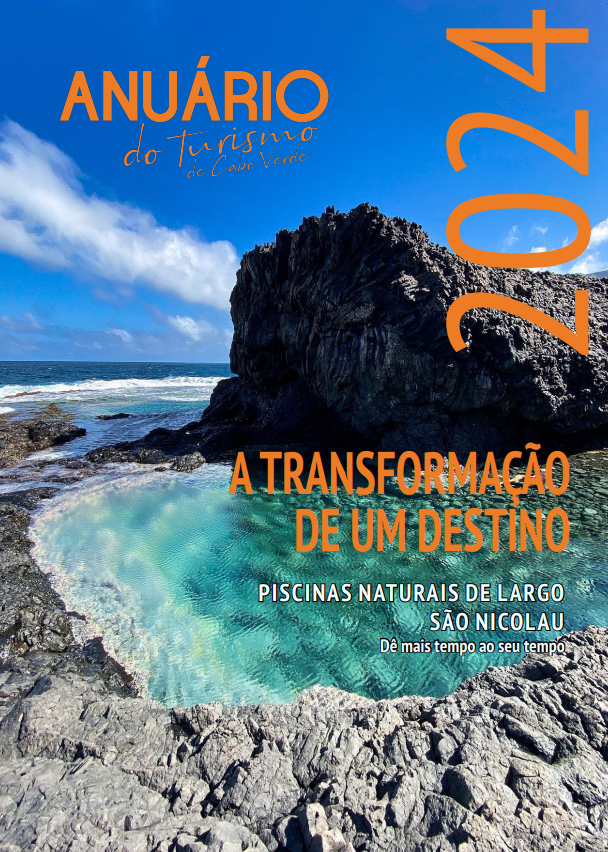
Turismo Costeiro e Marítimo em Cabo Verde. Rumo a um destino sustentável
Cite this paper:
Sarmento, E. (2024). Turismo costeiro e marítimo em Cabo Verde. Rumo a um destino sustentável. In Morgado, Carlos (2024). Anuário do Turismo de Cabo Verde 2024: a transformação de um destino (pp.30-32). Praia, Cabo Verde.
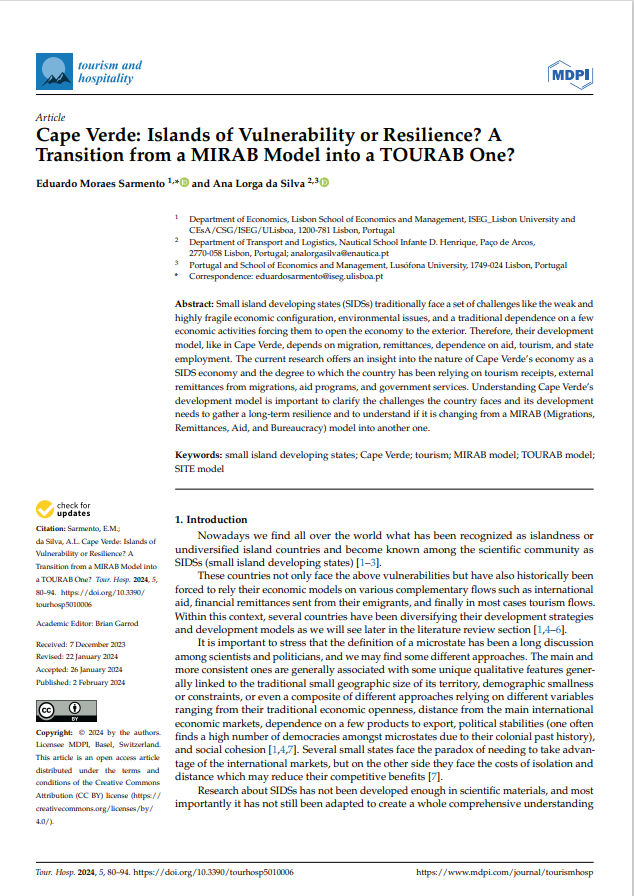
Cape Verde: Islands of vulnerability or resilience? A transition from a MIRAB Model into a TOURAB one?
Abstract:
Small island developing states (SIDSs) traditionally face a set of challenges like the weak and highly fragile economic configuration, environmental issues, and a traditional dependence on a few economic activities forcing them to open the economy to the exterior. Therefore, their development model, like in Cape Verde, depends on migration, remittances, dependence on aid, tourism, and state employment. The current research offers an insight into the nature of Cape Verde’s economy as a SIDS economy and the degree to which the country has been relying on tourism receipts, external remittances from migrations, aid programs, and government services. Understanding Cape Verde’s development model is important to clarify the challenges the country faces and its development needs to gather a long-term resilience and to understand if it is changing from a MIRAB (Migrations, Remittances, Aid, and Bureaucracy) model into another one.
Cite this article:
Sarmento, E.; Silva, Ana (2024). Cape Verde: Islands of Vulnerability or Resilience? A Transition from a MIRAB Model into a TOURAB One? Tour. Hosp. 2024, 5(1), 80-94; https://doi.org/10.3390/tourhosp5010006. MDPI. Special Edition Submit to Special Issue: Small Island Developing Countries (SIDS): Tourism between Innovation and Authenticity for Better Sustainable Developing Paths
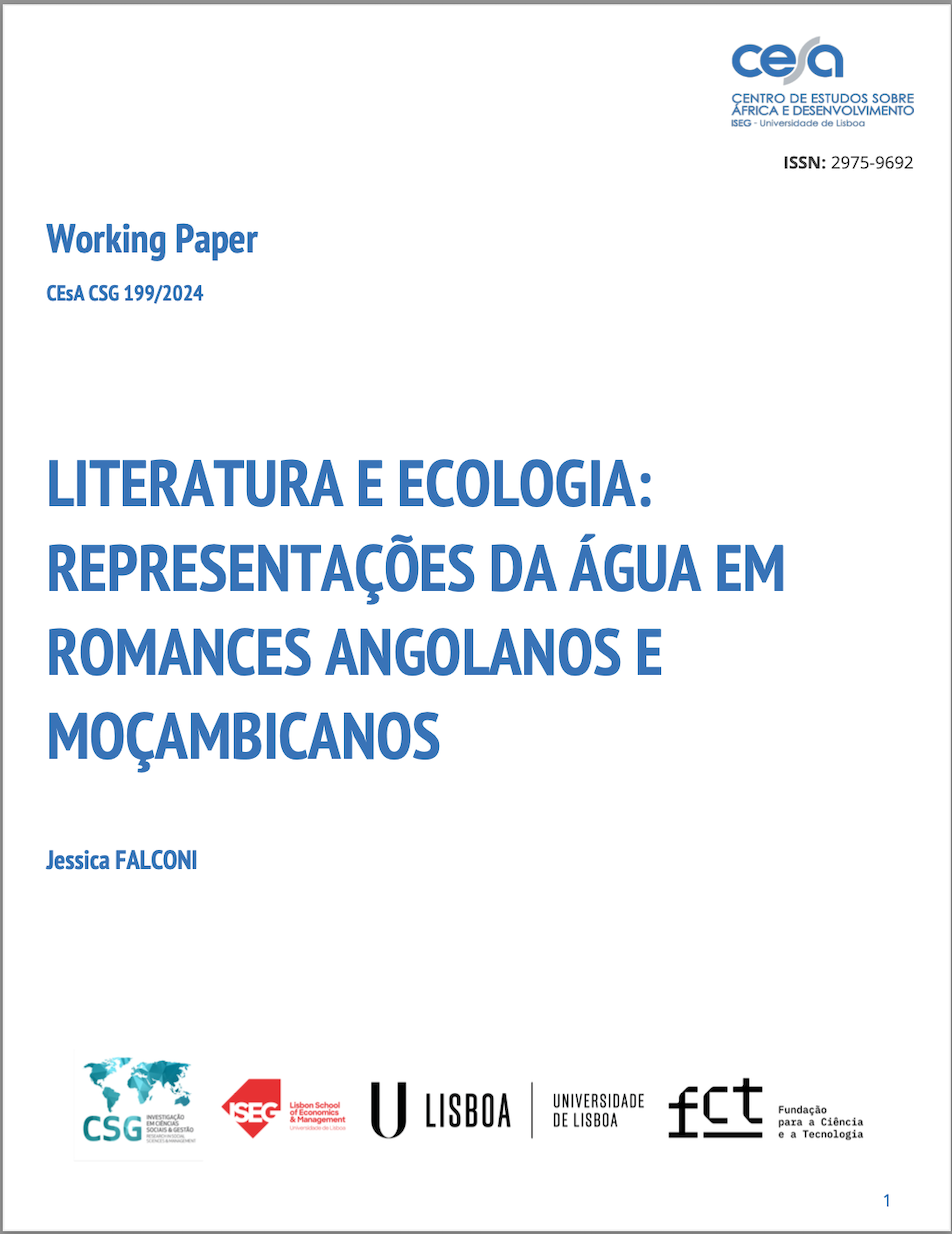
Working Paper 199/2024: Literatura e Ecologia: Representações da água em romances angolanos e moçambicanos
Abstract:
This article offers a brief cartography of the narrative role of water in Angolan and Mozambican literature, through a comparative reading of four novels: O desejo de Kianda (1995) by the Angolan Pepetela; De Rios Velhos e Guerrilheiros. I. O Livro dos Rios (2006) by Luandino Vieira; Água. Uma novela rural (2016) and Ponta Gea (2017) both by the Mozambican João Paulo Borges Coelho.
The introduction places the proposed cartography within the framework of ecocritical studies, whose various paradigms offer useful tools and concepts for reading the selected literary works. The thematic and comparative methodological approach highlights experiences and imaginaries common to two post-colonial contexts, despite the difference in scenarios, themes, aesthetic choices and narrative strategies. The analysis aims to demonstrate that water is a crucial element in narrating post-colonial Angolan and Mozambican societies.
Cite this Working Paper:
Falconi, Jessica (2024). “Literatura e Ecologia: Representações da água em romances angolanos e moçambicanos”. CEsA/CGS – Documentos de trabalho nº 199/2024
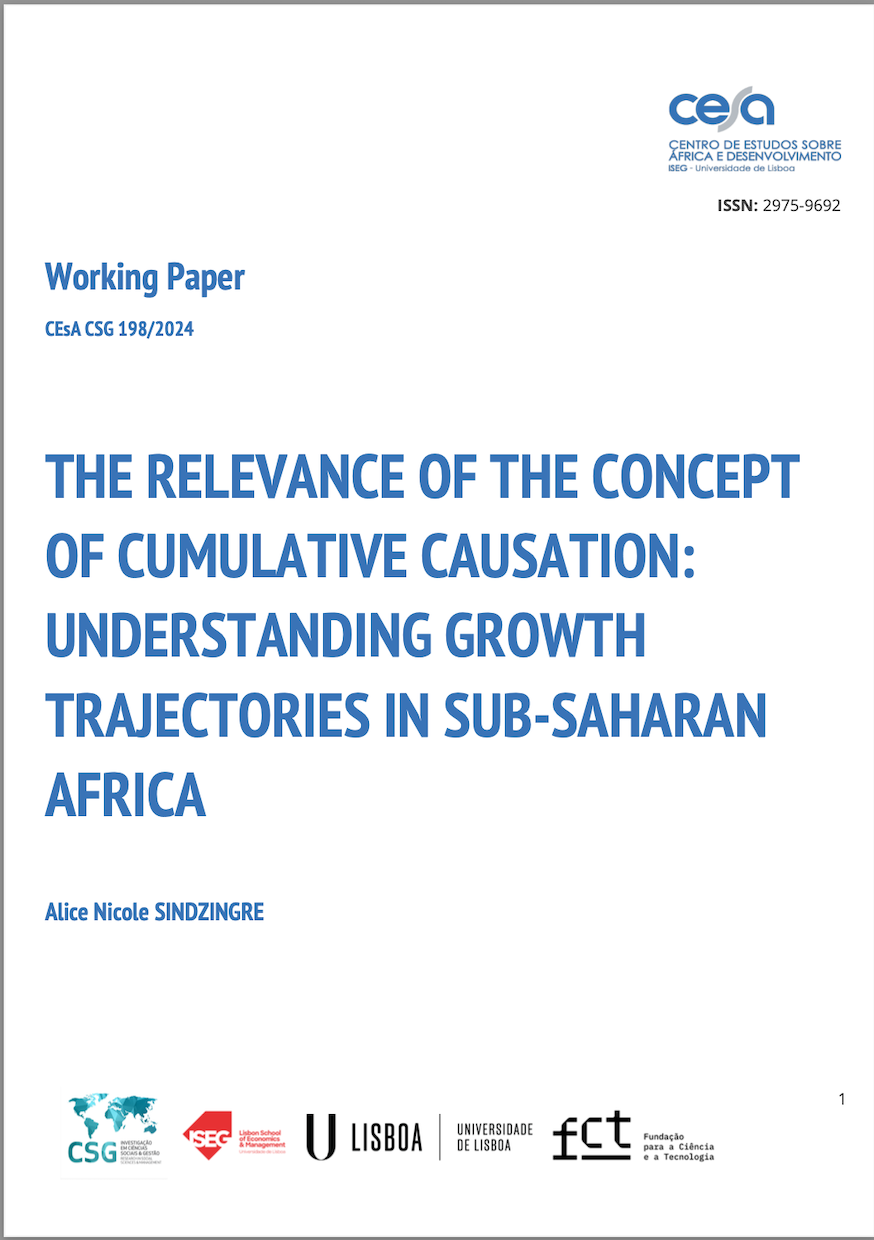
Working Paper 198/2024: The Relevance of the Concept of Cumulative Causation: Understanding growth trajectories in Sub-Saharan Africa
Abstract:
Differences in growth trajectories among countries – including the possibility of divergence -, are a central issue in economics. Mainstream economics explain growth processes via varieties of neoclassical models, even improved with concepts such as institutions. Yet such models have difficulties in providing accurate accounts of the growth trajectories of many developing countries, notably low-income ones. It is argued that the growth paths of low-income countries are more appropriately explained by the theoretical framework that relies on the nexus of concepts of cumulative causation, non-linearities, threshold effects, self-reinforcing processes, irreversibility, path dependence and traps – though this approach remains marginal in mainstream economic analyses of growth and development. Firstly, this nexus of concepts is a powerful framework concerning the possibility and explanation of dynamic divergence regarding growth between countries, as it exhibits properties such as: the possibility of cumulative, dynamically self-reinforcing, processes; the existence of thresholds and tipping points; multiple equilibria. Secondly, cumulative causation, by definition, involves a combination of causes: its conceptual framework allows for the integration of several dimensions – economic, political, social, cognitive -, whose combination results in either virtuous or vicious circles. In developing countries, these causes (and their coalescence) typically consist in economic structures (e.g., commodity-based export markets), political institutions and social norms (predatory regimes, high inequality) as well as types of public policies.
Cite this Working Paper:
Sindzingre, Alice Nicole (2024). “The Relevance of the Concept of Cumulative Causation: Understanding growth trajectories in Sub-Saharan Africa”. CEsA/CGS – Documentos de trabalho nº 198/2024
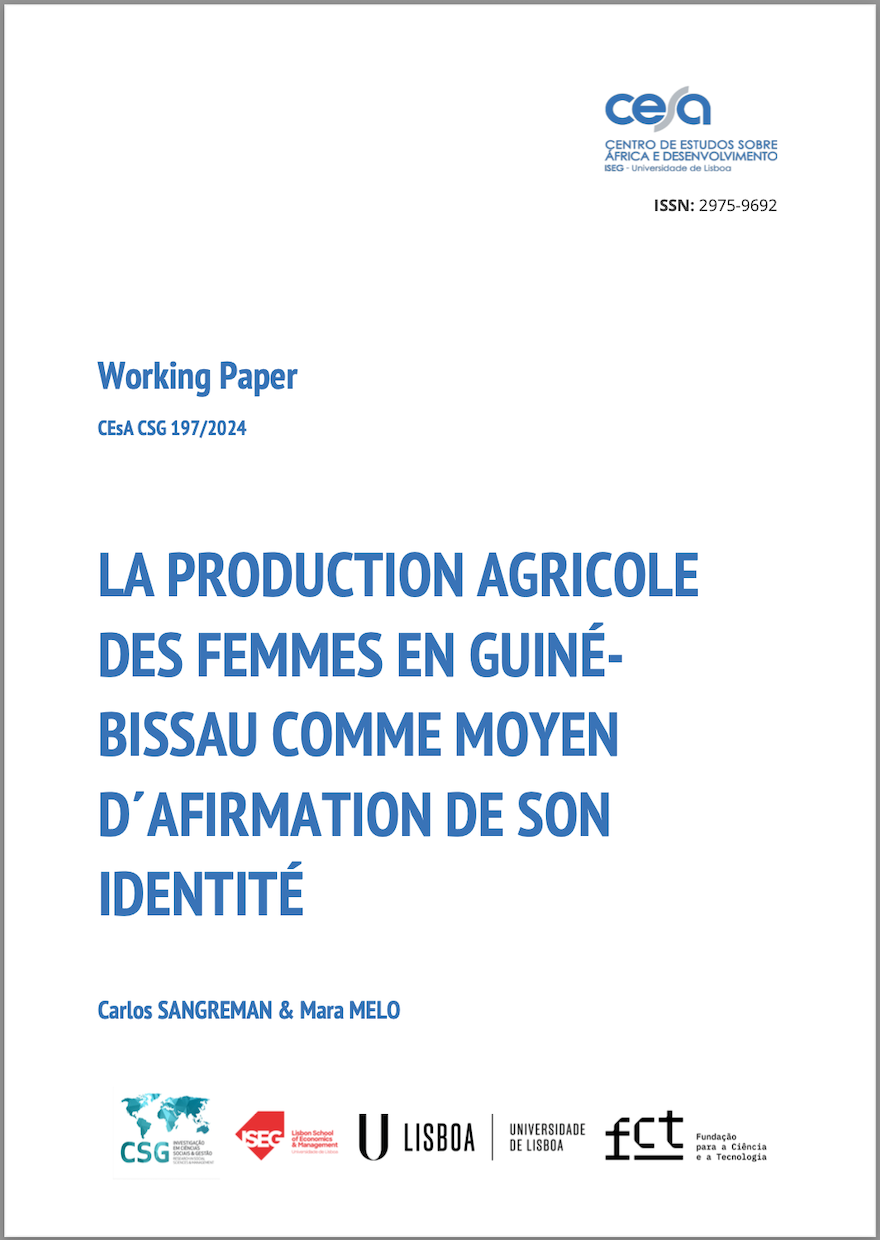
Working Paper 197/2024: La Production Agricole des Femmes en Guiné-Bissau comme Moyen d´Afirmation de son Identité
Abstract:
This working paper is an intermediate product of the study done for Swiss Cooperation in Guinea-Bissau, written in French without any point in Portuguese. What we demonstrate, as well as the principles of restitution and appropriation by the persons or institutions that access to respond to surveys or interviews, are words that do not translate into concrete actions for this Cooperation. The data were obtained by surveys and interviews in the regions of Bissau, Biombo, Bafatá, and Oio, with the producers (which also include a limited number of male producers) of leguminous agricultural products, in a sample of 160 people chosen at random. At the option of the promoter, the study focused on the marketing of products and not on production. To better understand the results, it must be said that this business model is not very profitable, but it is an activity that gives a greater independence of women in relation to men in the family space, since decisions about the use of profits belong to the producers. It also has a potential environment of action for the affirmation of the social (and not just family) identity of women that should not be despised although, as far as we can see, this is expressed for now only in the organization of associations of producers.
Cite this Working Paper:
Sangreman, C. e Melo, M. (2024). “La Production Agricole Des Femmes En Guiné-Bissau Comme Moyen D´Afirmation De Son Identité”. Instituto Superior de Economia e Gestão – CEsA/CGS – Documentos de trabalho nº 197/2024





